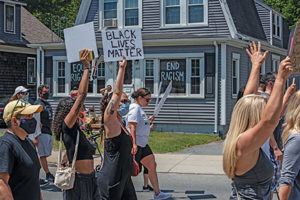
Protesters march by a house on South Main Street in Acushnet that had its windows lettered with words of support for the Black Lives Matter movement on 6/13/20, when approximately 100 people marched from the Gifts to Give parking lot on Slocum Street to the intersection at Parting Ways where they were met by another 50 or so people for a rally and protest against police brutality against Blacks in response to the murder of George Floyd by a Minneapolis police officer, and the death of Malcolm Gracia at the hands of New Bedford police. Photo by Glenn C. Silva. for the Fairhaven Neighborhood News.
By Beth David, Editor
Approximately 100 people marched from the Gifts to Give parking lot in Acushnet, up Slocum Street to the intersection at Parting ways, where they were met by another 50 or so people for a protest and railly. Black speakers spoke to the mostly white crowd, and then opened it up for others to speak. Police blocked off streets for the peaceful event on Saturday, 6/13.
One of the organizers told the crowd to push kids to be police officers and in positions to be able to make change.
She addressed the allies of the movement, saying, “We appreciate you guys. You don’t have to be out here, but you are for your friends, co-workers, family.”
Protests have sprung up across the country, some violent and destructive, in response to police brutality against Black men in particular. After George Floyd died from asphyxiation on May 25 after a Minneapolis police officer held his knee on Mr. Floyd’s neck for nearly nine minutes, spontaneous protests, marches and riots broke out across the country and have not stopped.
“We have to hold the police accountable,” said another woman. “We’re not going to give up, we’re not, not until we’re all heard.”
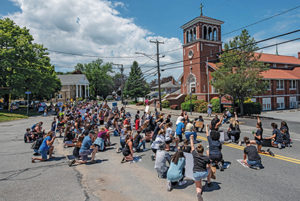
Protestors take a knee at the corner of Main Street and Wing Road in Acushnet on 6/13/2020 during the Black Lives Matter march and rally, when approximately 100 people marched from the Gifts to Give parking lot on Slocum Street to the intersection at Parting Ways where they were met by another 50 or so people. Photo by Glenn C. Silva for the Fairhaven Neighborhood News.
Jaelyn Williams told the crowd she went to Acushnet schools and “grew up with racism in this town.”
She said parents need to expose their children to Black people, Black culture.
“That’s the only way they’re not going to have the same experience that I did,” said Ms. Williams. “I’m begging you. I do not want little Black girls to feel the way I did.”
She said she was made fun of because of her lips, her hair, her skin color.
“We need to do better as a town. Acushnet needs to do better,” said Ms. Williams.
She said people need to stand up when they see microaggressions, such as people telling her she sounds like a white girl or acts like a white girl.
“That’s offensive. Don’t say it,” said Ms. Williams. “Don’t call me a white Black girl. I’m not white Black girl, I’m a Black girl.”
She said schools do not teach Black History so parents need to do it.
“If they’re not going to do it in the schools, it’s our responsibility to do it in the home,” she said. “That’s all I wanted to say. Please do the work at home.”
Other speakers, both men and women said they had been targeted and stopped by police simply because of their skin color.
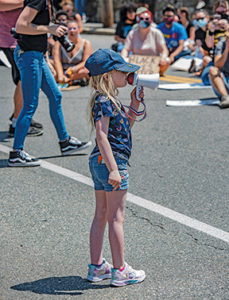
Paige Hamilton voices her solidarity with the Black Lives Matter movement by stating: “Black people don’t deserve to be treated the way they’re being treated right now,” on 6/13/20 in Acushnet when approximately 100 people marched from the Gifts to Give parking lot on Slocum Street to the intersection at Parting Ways where they were met by another 50 or so people. Photo by Glenn C. Silva for the Fairhaven Neighborhood News.
Little Paige Hamilton spoke to the crowd and simply said: “Black people don’t deserve to be treated the way they’re being treated right now.”
Erik Andrade said that the fight was not only for Black people, but for indigenous people, and all displaced people. He said it was not just about George Floyd but about other high profile cases of police killing Black people, including Malcom Gracia of New Bedford.
He said the demands of the movement include a civilian review board in New Bedford with subpoena power. Anything less is “window dressing,” he said.
Another man spoke and said he had an eight-year-old daughter and he did not want her to have to be out there protesting.
“Decade after decade Black people have to be out here in these streets marching just to be treated as human,” he said. “I don’t want that happening to my daughter and the next generation. But unfortunately, I have little hope that is going to be the case.”
Monique Onuoha, one of the organizers, told the story of a young man in Dartmouth who recently was being harassed and physically threatened because he is Black.
“This is continuing,” said Ms. Onuoha. “It’s not just the older generation, it’s our generation. That’s a problem.”
She also told the world to stop sexualizing Black women, stop making fun of the clothes they wear. She said they are wearing the same clothes as the white kids, but their bodies are different.
“It is in our DNA, our bodies are typically different,” she said.
“Stop sexualizing us, stop making fun of our hair, stop trying to touch our hair,” she said. “Just be aware.”
She told the white allies that there is a lot of information online about how to be an ally.
“Thank you so much for being out here today. It means a lot,” she said. “Hopefully, you’ll continue to fight with us.”
Mackenzie McCree’s mother, who is white, also spoke, telling the crowd that she
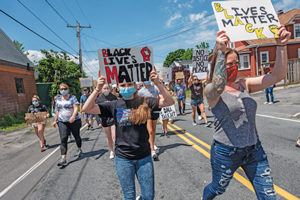
Approximately 100 people march up Slocum Street in Acushnet to the intersection at Parting Ways where they were met by another 50 or so people for a Black Lives Matter rally on 6/13/20. Photo by Glenn C. Silva for the Fairhaven Neighborhood News.
saw Acushnet through a different lens as MacKenzie grew up in town.
“Because when it’s your daughter and you see her go through pain…” she said trailing off. “I never had anyone tell me at six years old, ‘I don’t want to play with you,’ in the playground. She did.”
“I’m proud of us her, taking the first step,” she said, adding, “we as white allies need to continue to educate ourselves and not be ignorant.”
She said it will require uncomfortable conversations with family and friends, but they need to have them. Because sometimes “we can get through to them when they won’t even listen to a Black voice.”
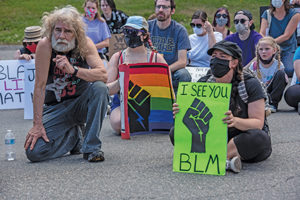
Protestors of all ages came out to protest in support of the Black Lives Matter movement on 6/13/20 in Acushnet when approximately 100 people marched from the Gifts to Give parking lot on Slocum Street to the intersection at Parting Ways where they were met by another 50 or so people. Photo by Glenn C. Silva for the Fairhaven Neighborhood News.
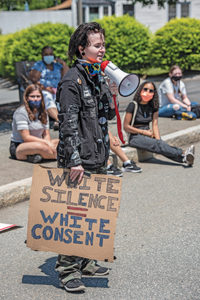
Transgender speaker Lucian Breland told the crowd to be kind to people because you never know the kind of trauma they are facing that day, “never mind every day,” at a Black Lives Matter march and rally in Acushnet on 6/13/20, when approximately 100 people marched from the Gifts to Give parking lot on Slocum Street to the intersection at Parting Ways where they were met by another 50 or so people. Photo by Glenn C. Silva for the Fairhaven Neighborhood News.
•••
Support local journalism, donate to the Neighb News with PayPal.
Click here to download the entire 6/18/20 issue: 06-18-20 AcushnetBLM



